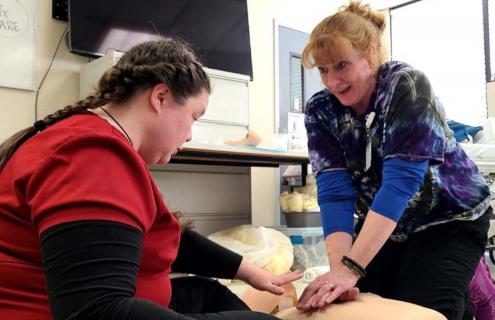
Thousands of people die from choking every year; it is fourth leading cause of unintentional injury death, according to the National Safety Council.
It’s something you think may never happen to you or your loved ones, but APD employees requested a CPR class for a variety of reasons: a new job at APD Lifecare, aging in place with a spouse, a chance to learn automated external defibrillator (AED) technology, or updating CPR skills.
APD’s clinical educator Amanda Fay, MSN, RN, WCC responded and created a CPR class for employees. Two classes were held in March and April for participants to learn the “chain of survival” actions to take when encountering a choking person, including assessing the scene for safety, checking heart and carotid arteries for heartbeat, and starting compressions, with no more than a 10 second break between rounds to yell for help or call ambulance.
Each class member was hands on with a CPR training mannequin to practice the steps and “perform as the patient’s heart muscle to sustain life,” said Megan Rae, Contract and Project Specialist at APD.
“Being CPR trained, you have a tool that can help anyone anywhere. You get to be someone’s heart, for a limited time,” Fay said. She notes that if you are choking, stay in public. Many people die in restaurant restrooms because they are embarrassed when they start choking and run for privacy.
Fay also taught APD employees how to use the AED machine, a portable electronic device designed for the layperson to help the heart establish an effective heart rhythm. Students were able to see what is in the AED kit, such as scissors to cut the patient’s clothing to clear the chest area, and hear how it guides use with voiced directions.
“I truly learned some new things,” Rae said. “I was not aware how hard one pushes for compressions. The mannequins are cool — they have shoulder lights indicating when you are doing it right. Amanda told us you may break ribs on people who are older. This means that you are doing compression right. If they complain that means they lived and we did our job right.”